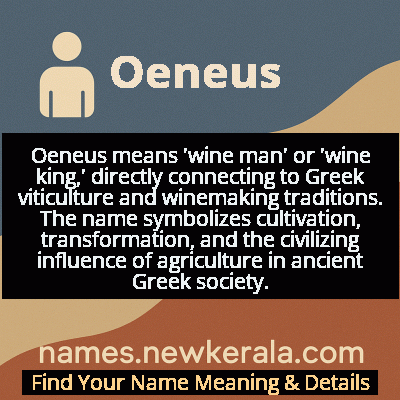Oeneus Name Meaning & Details
Origin, Popularity, Numerology Analysis & Name Meaning of Oeneus
Discover the origin, meaning, and cultural significance of the name OENEUS. Delve into its historical roots and explore the lasting impact it has had on communities and traditions.
Name
Oeneus
Gender
Male
Origin
Greek
Lucky Number
7
Meaning of the Name - Oeneus
Oeneus means 'wine man' or 'wine king,' directly connecting to Greek viticulture and winemaking traditions. The name symbolizes cultivation, transformation, and the civilizing influence of agriculture in ancient Greek society.
Oeneus - Complete Numerology Analysis
Your Numerology Number
Based on Pythagorean Numerology System
Ruling Planet
Neptune (Ketu)
Positive Nature
Intuitive, analytical, spiritual, and inquisitive.
Negative Traits
Secretive, reserved, aloof, and can be overly critical.
Lucky Colours
Green, yellow.
Lucky Days
Monday.
Lucky Stones
Cat’s eye, moonstone.
Harmony Numbers
1, 5, 6.
Best Suited Professions
Scientists, researchers, spiritual leaders, detectives.
What People Like About You
Depth of knowledge, analytical skills, spirituality.
Famous People Named Oeneus
Oeneus of Calydon
Mythological King
Introduced winemaking to Aetolia after receiving the first grapevine from Dionysus
Oeneus (son of Portheus)
Mythological Ruler
Ancestor of Diomedes and key figure in Trojan War genealogy
Oeneus (Arcadian)
Mythological King
Alternative tradition of wine culture introduction in Arcadia
Name Variations & International Equivalents
Click on blue names to explore their detailed meanings. Gray names with will be available soon.
Cultural & Historical Significance
The cultural significance of Oeneus extends beyond mere mythology into the social fabric of ancient Greek life. Wine was central to Greek religious rituals, social gatherings, and philosophical discourse, making Oeneus a foundational figure in the development of Greek cultural identity. His narrative also explores themes of proper kingship, the responsibilities of rulers to their people, and the complex interplay between family loyalty and political duty. The tragic elements of his story—including his deposition and eventual restoration—reflect Greek concerns about maintaining hard-won civilization against both human and divine challenges.
Extended Personality Analysis
Individuals carrying the name Oeneus are typically characterized by a unique blend of traditional wisdom and innovative spirit. They exhibit the patience and foresight of a cultivator, understanding that true value develops over time through careful nurturing and attention to detail. Like the mythological king who transformed wild landscapes into productive vineyards, modern Oeneus personalities demonstrate remarkable perseverance and the ability to see potential where others see only challenges. They are natural leaders who prefer to build consensus and foster growth rather than command through authority alone.
Their personality often includes a strong sense of hospitality and community building, reflecting the social importance of wine in Greek culture. Oeneus individuals tend to be excellent hosts who understand the value of creating spaces where relationships can flourish. However, they may also struggle with the weight of legacy and the challenges of maintaining what they've built across generations. There's often a melancholic undertone to their character—a recognition that all cultivated things require constant care and are vulnerable to both internal and external threats. This combination of visionary optimism and sober realism makes them particularly effective in roles requiring long-term planning and cultural preservation.
Modern Usage & Popularity
In contemporary naming practices, Oeneus remains an extraordinarily rare choice, primarily confined to academic families, classical scholars, and mythology enthusiasts seeking distinctive names with profound historical resonance. The name has never achieved mainstream popularity and doesn't appear in any modern baby name databases or popularity charts. Its usage is almost exclusively limited to families with strong connections to classical studies or Greek heritage. However, the recent trend toward unique mythological names has generated minor interest in Oeneus among parents looking for names that are both uncommon and culturally significant. The name's association with wine and cultivation also makes it appealing to families in viticulture regions or those with agricultural backgrounds. Despite this niche interest, Oeneus maintains its character as a scholarly, archaic name that carries substantial cultural weight without trending toward overuse.
Symbolic & Spiritual Meanings
Symbolically, Oeneus represents the transformative power of cultivation and the civilizing influence of agriculture on human society. The name embodies the journey from raw nature to refined culture, mirroring the process of turning wild grapes into sophisticated wine. It symbolizes patience and long-term vision—the understanding that true value develops gradually through careful nurturing and attention to process. Oeneus also represents the ideal of stewardship-based leadership, where rulers see themselves as cultivators of their people's potential rather than mere commanders. The name carries deeper metaphorical meanings related to fermentation and transformation—the mysterious process through which ordinary elements become extraordinary through time and proper conditions. This connects to themes of personal growth, where challenges and time work together to develop character and wisdom. The tragic elements of the mythological Oeneus's story add layers of meaning about the fragility of civilization and the constant work required to maintain cultural achievements across generations.

